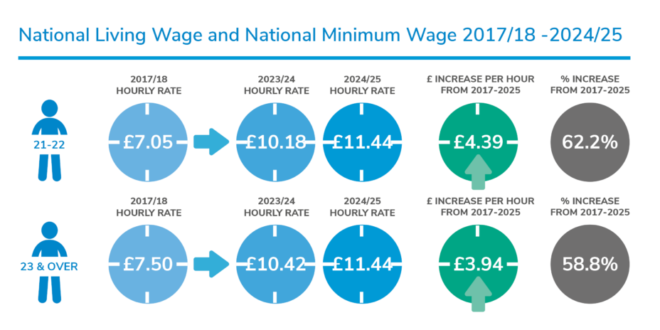The National Minimum Wage (NMW) is a crucial policy that ensures workers receive fair compensation for their labor. As we approach 2024, updates to the NMW are set to impact both employees and employers across the country. Understanding these changes is essential for staying informed and compliant. In this guide, we’ll explore the key updates to the National Minimum Wage for 2024, how these changes might affect you, and what steps you should take to adapt.
Key Updates to the National Minimum Wage in 2024
1. New Minimum Wage Rates
For 2024, the National Minimum Wage rates have been revised. These updates reflect the government’s commitment to improving workers’ earnings and addressing inflation. Here’s a breakdown of the new rates:
- For Workers Aged 23 and Over: The new minimum wage rate is set at £11.00 per hour, up from the previous rate of £10.42.
- For Workers Aged 21 to 22: The hourly rate has increased to £9.70, from £9.18.
- For Workers Aged 18 to 20: The rate has been updated to £7.95 per hour, compared to £7.49.
- For Under 18s: The minimum wage now stands at £5.65 per hour, up from £5.28.
- Apprentice Rate: The hourly wage for apprentices has been raised to £6.00, from £5.28.
2. Rationale Behind the Changes
The adjustments to the National Minimum Wage for 2024 are designed to address the cost of living and ensure that wages keep pace with inflation. The government’s goal is to provide fairer compensation to workers and improve overall living standards.
3. How the Changes Compare to Previous Years
Compared to previous years, the 2024 increase is notable, reflecting a more substantial rise to counteract the effects of inflation. This change represents a significant boost in earnings for many workers and aligns with broader economic policies aimed at supporting low-income households.
Impact on Employees and Employers
1. Effects on Employees
For employees, the updated National Minimum Wage means higher earnings, which can improve financial stability and quality of life. This increase will benefit workers in lower-paid positions and is expected to have a positive impact on overall job satisfaction and economic security.
2. Effects on Employers
Employers will need to adjust their payroll systems to accommodate the new wage rates. This adjustment may lead to increased labor costs, particularly for businesses with a large number of minimum wage employees. It’s essential for employers to review their budgets and financial plans to manage these changes effectively.
3. Steps for Employers to Adapt
Employers should take the following steps to adapt to the new minimum wage rates:
- Update Payroll Systems: Ensure your payroll software reflects the new wage rates.
- Communicate with Employees: Inform your staff about the upcoming changes and how it will affect their pay.
- Review Budgets: Adjust your budget to account for increased labor costs.
- Stay Compliant: Make sure you are compliant with all relevant wage laws and regulations.
FAQ About National Minimum Wage 2024
Q: What are the new National Minimum Wage rates for 2024?
A: For 2024, the minimum wage rates are: £11.00 per hour for workers aged 23 and over, £9.70 for those aged 21 to 22, £7.95 for ages 18 to 20, £5.65 for under 18s, and £6.00 for apprentices.
Q: Why is the National Minimum Wage increasing in 2024?
A: The increase is designed to address inflation and the rising cost of living, aiming to ensure that wages provide fair compensation and support workers’ financial well-being.
Q: How will the new rates affect employees?
A: Employees will benefit from higher earnings, which can improve their financial stability and overall quality of life.
Q: How should employers prepare for the wage changes?
A: Employers should update their payroll systems, communicate with employees, review their budgets, and ensure compliance with wage laws.
Q: What should I do if my employer does not comply with the new minimum wage rates?
A: If your employer does not comply with the new rates, you can report the issue to the relevant labor authority or seek advice from employment support organizations.
Q: Will the National Minimum Wage changes affect all workers equally?
A: The changes will affect all workers earning the minimum wage, but the impact will vary based on the worker’s age and current wage rate.
Read more Emmanuel Macron: France’s Modern Leader and His Impact on Global Politics
Conclusion
The updates to the National Minimum Wage for 2024 represent a significant step toward improving workers’ earnings and addressing the challenges of inflation. Understanding these changes is crucial for both employees and employers. Employees can look forward to increased pay, while employers need to prepare for the adjustments in their payroll systems and budgets. Staying informed and proactive will help ensure a smooth transition and continued compliance with wage regulations.

